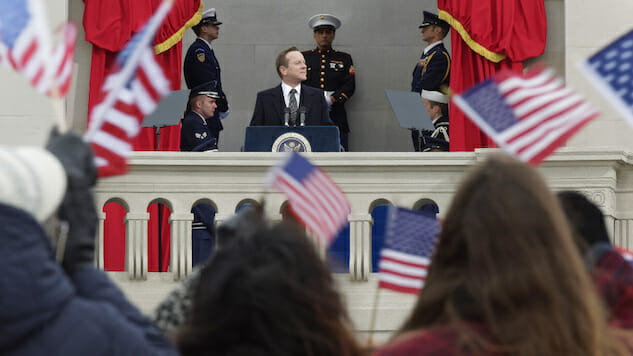Designated Survivor’s Key Tragedy Isn’t the Capitol Bombing
ABC/Ben Mark Holzberg
Wow, cliffhanger! Geez, do you guys think Hannah managed to divert the trajectory of that bullet before the Secret Service took her down? Can you believe they took a midseason break on that shot? Oof.
I didn’t watch the first half of the season until recently. I had stuff to do. I had my limited TV allegiances and I wasn’t sure I could really accommodate a grim and probably narratively suspect fantasia about the American government disappearing. I was a West Wing girl from way back and Martin Sheen was the fictional POTUS I wished could be the real one. I wasn’t sure how Kiefer Sutherland was going to fill those shoes.
Some stuff about this show is firmly in the Big Giant Meh category. Subplots with a painful signal-to-noise ratio. Threads that don’t complicate things in a good way. Pat trope of “Mister Nice Guy thrust into unfathomable character-testing situation for which he is not remotely ready and with millions of lives at stake, which is rather stressful.” And yet.
When the Capitol Building went up in flames in the first minutes of the pilot, taking out everyone but HUD Secretary Tom Kirkman (Sutherland), my first thought wasn’t how horrible and scary and unthinkable it was to have a thousand human beings—virtually the entire U.S. government—wiped off the map by a terrorist attack. It was, “I wonder how many people, for one reason or the other, are fantasizing about this scenario right now.” Not necessarily a mass-casualty bombing, because most people aren’t criminally insane, but something that forces a total reset of our government. The bombing wasn’t really even a “tragedy” in the grand scheme of the show. It was straight-up wish fulfillment. Yes, it’s sad to look at Capitol Hill reduced to ashes and imagine it really happening. But we never developed any of the characters in the disappeared administration, beyond the suggestion that it was a morass of corruption and that Kirkman was considered a joke by most of his colleagues largely for his earnest attachment to ethics. So they aren’t even that real to us. And as Kirkman’s sworn in, what we’re really thinking about isn’t the horror that put him there. It’s a surge of excitement over the idea that a humble, ethical man could suddenly be thrust into that role and have the chance to rebuild the government with honest civil servants. The tragedy isn’t that a terrorist attack took out the sitting government, although that is, de facto, tragic. It’s that even with one thousand people taken out, the new guy’s beset with a creeping web of corruption before the first day is over. That the bombing of the Capitol during the State of the Union wasn’t an end; it was a beginning. And that the monsters are still inside the walls. The jihadi who’s accused of the bombing is a more sympathetic character than half of the people surrounding the new President. Ouch.
And half of the remaining good ones are forced to sacrifice themselves, including FBI Director Jason Atwood (Malik Yoba) and an NSA employee (Brent Sexton, in a quick but intense performance as whistleblower Gabriel Thompson) who deliberately puts himself in front of a life sentence in order to get key documents to Kirkman. By the midpoint of the season things are also looking rough for Atwood’s perspicacious junior, Hannah Wells (Maggie Q) and her tech guy, Chuck (Jake Epstein). Conspiracies abound; power-grabbing sets in before Kirkman can even trade his Cornell hoodie for a suit and tie. By the time he’s managed to convene a new Congress, a shadowy figure has a gun trained on him, poised to shoot the minute the Vice President Peter MacLeish (Ashley Zuckerman) is sworn in; it’s a little hard to tell to what extent MacLeish is puppet versus puppeteer, but he certainly knows what’s going to go down at the swearing-in and he certainly hasn’t done anything to stop it by the time we cut to black.
Whatever you think of the show’s quality, its story choices and the performances of the actors, its central ideas and questions are, with good reason, preoccupations of most Americans who are remotely paying attention to what’s going on around them right now. What would it take—if it’s possible at all—to elect a government that most of us can at least sort of trust? Is it possible for an honest man to be President? Is there any event that would bring people together to prioritize the elimination of corruption over partisan agenda? Is there any path to the ideal of government according to the will of the people, and what happens if the majority of people have really, really ignorant or misguided ideas of what’s right?